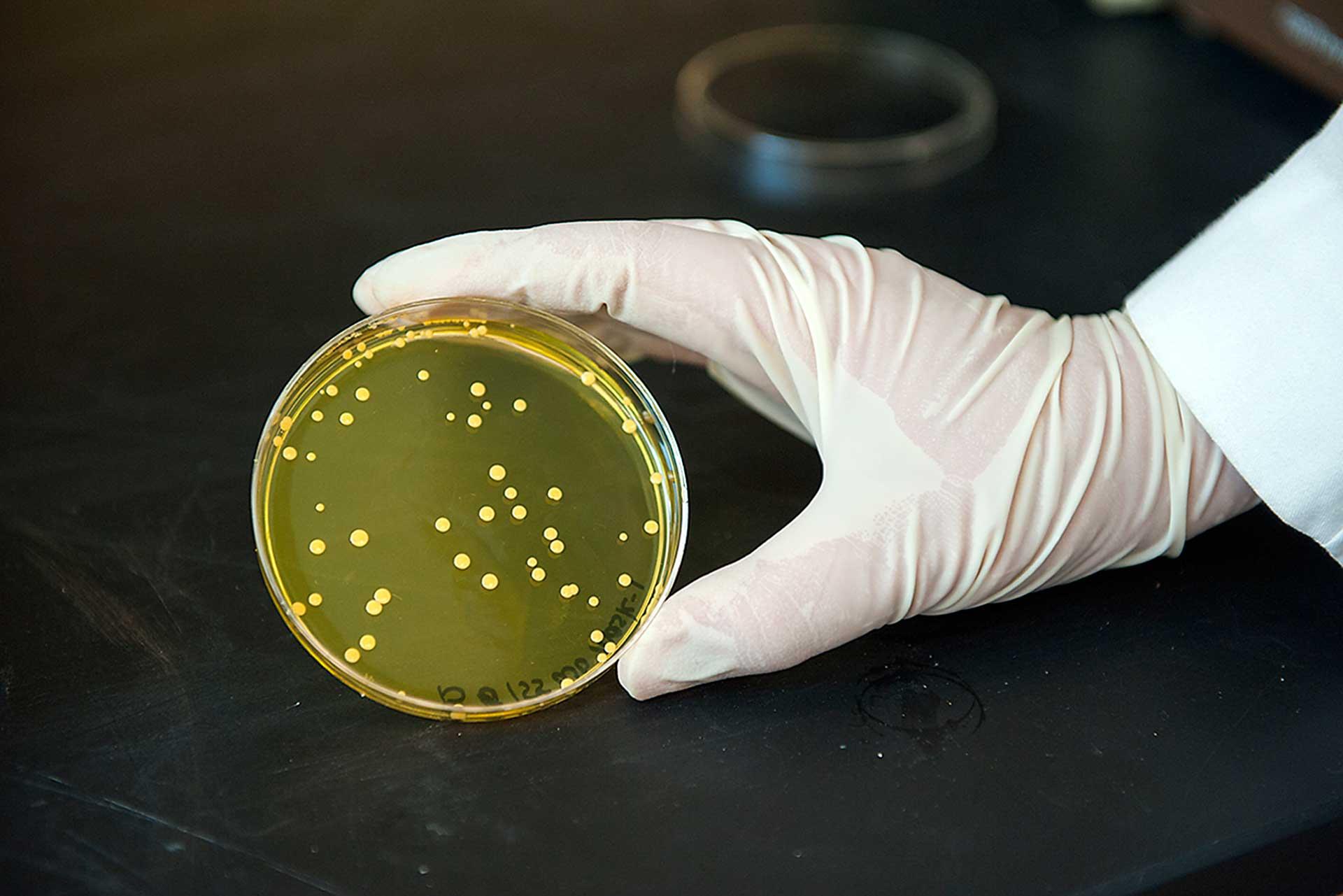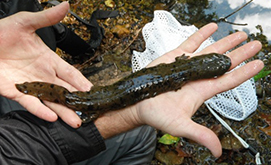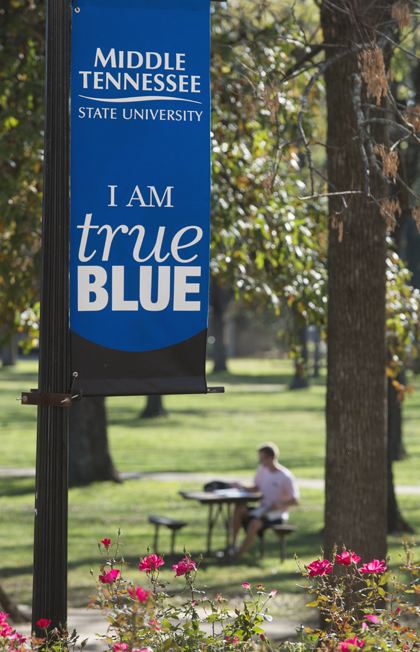
Biology
Especially valuable to students who pursue advanced study for careers in academia, conservation organizations, or the medical field.
Biology, Organismal Biology and Ecology Concentration, B.S.
The Organismal Biology and Ecology major is intended for students interested in exploring the biology of organisms. Courses allow students to focus on the structure, function, and physiology of a broad array of organisms: from algae, fungi and plants to fishes, reptiles, amphibians, birds, and mammals. Faculty involved in this major integrate their research to additionally address issues in behavioral ecology, climate change, evolutionary ecology and history, population dynamics, community ecology, and wildlife diseases. The major provides a comprehensive background for students with career interests in being a field ecologist, a park ranger or naturalist, an environmental consultant, a natural resource manager, or for students to further their education to pursue a graduate degree.
News Briefs

A region's richness
Biology isn't all microscopes and petri dishes. The department has a number of professors whose research takes them — and many of their students — into the field to study the visible world and its creatures. Whether helping Dr. Vincent Cobb in his study of the thermal ecology of snakes in the region or assisting Dr. Brian Miller in his research on hellbenders, one of the largest (and some would say ugliest) salamanders in the world, Biology majors will find that there is plenty to see and learn about right here in middle Tennessee.

Research that matters
For more than a decade, Dr. Elliot Altman has explored the mysteries of peptide therapy research. His work has been part of a process that could revolutionize the treatment of types of arthritis and cancer in years (as opposed to decades). (His research also includes discovering ways to increase the efficiency of certain alternative fuels.) Motivated students in the Biology Department can be part of that process or other fascinating areas of work that makes a difference in people's lives.
News Briefs
A region's richness

Biology isn't all microscopes and petri dishes. The department has a number of professors whose research takes them — and many of their students — into the field to study the visible world and its creatures. Whether helping Dr. Vincent Cobb in his study of the thermal ecology of snakes in the region or assisting Dr. Brian Miller in his research on hellbenders, one of the largest (and some would say ugliest) salamanders in the world, Biology majors will find that there is plenty to see and learn about right here in middle Tennessee.
Research that matters

For more than a decade, Dr. Elliot Altman has explored the mysteries of peptide therapy research. His work has been part of a process that could revolutionize the treatment of types of arthritis and cancer in years (as opposed to decades). (His research also includes discovering ways to increase the efficiency of certain alternative fuels.) Motivated students in the Biology Department can be part of that process or other fascinating areas of work that makes a difference in people's lives.
Related Media

Biology, Organismal Biology and Ecology Concentration, B.S.
A degree in biology is a “foundation degree” — a direct door-opener for a large number of careers, as well as a crucial first undergraduate step on the path toward those careers that require additional graduate training.
Examples include
- Agricultural scientist
- Animal behaviorist
- Bio-engineer
- Desert ecologist
- Medical laboratory tech
- Medical librarian
- Microbiologist
- Molecular endocrinologist
- Park ranger
- Safety manager
- Science teacher
- State park resource ecologist
- Toxicologist
- Virologist
- Wildlife biologist
- Zoo biologist
Employers of MTSU alumni include
- Aegis Sciences Corporation
- American Red Cross
- Area High Schools
- Arnold Air Force Base
- Austin Peay State University
- Biomimetic Therapeutics
- Bristol-Myers Squibb Co.
- Center for Disease Control and Prevention
- Covance
- Cytometry Associates
- Environmental Science Corp.
- Erlanger Medical Center
- GenHunter Corporation
- ICON Clinical Research
- Jack Daniels Distillery
- Local Community Colleges
- Merck and Co.
- Monsanto
- Oak Ridge National Laboratory
- Pathgroup Laboratories
- Pfizer Inc.
- Tennessee Bureau of Investigation
- Tennessee Wildlife Resources Agency
- USDA
- Vanderbilt University Medical Center
- Vi-jon

MTSU’s Career Development Center
MTSU offers a comprehensive Career Development Center that serves students throughout the full student experience and beyond. They collaborate with faculty and staff to equip students with the tools to be marketable to the world of work and continuing education.
Students can schedule an appointment or check online resources and job boards at mtsu.edu/career.
Students can find current internship opportunities by talking to faculty and visiting the University job and internship board called Handshake .
Wondering what you can do with your major? Check out our What Can I Do with A Major In guides.

Biology, Organismal Biology and Ecology Concentration, B.S.
615-898-2847
Dennis Mullen, program coordinator
Dennis.Mullen@mtsu.edu
Every Biology major is required to declare a concentration area. Each area requires hours to be selected from a set of designated courses. Four tracks are available under the Organismal Biology and Ecology concentration: botany, zoology, ecology, or general.
All Biology majors are assigned a professional advisor. The student is responsible for seeking the assistance of the advisor. This catalog is not intended to provide the detail necessary for self-advising.
Academic Map
Following is a printable, suggested four-year schedule of courses:
Degree Requirements
| True Blue Core (TBC) | 41 hours |
| Major Requirements | 42 hours* |
| Major Core | 29 hours |
| Concentration | 10 hours |
| Major UD Electives | 3 hours |
| Supporting Courses | 19-20 hours* |
| Electives | 17-29 hours |
| TOTAL | 120 hours |
*This program requires courses that can also fulfill requirements of the True Blue Core curriculum. If program requirements are also used to fulfill True Blue Core requirements, the number of elective hours will increase.
True Blue Core (41 hours)
requirements (shown in curricular listings below) include courses in the Foundational Skills areas of Written Communication (WC), Information Literacy (Info Lit), Non-Written Communication (NWC), and Quantitative Literacy (Quant Lit). Knowledge Domains include Human Society and Social Relationships (HSSR), Scientific Literacy (Sci Lit), Creativity and Cultural Expression (CCE), and History and Civic Learning (HCL), which include Discovery and Explorations categories. Students must choose at least one course from each Discovery category.
The following courses required by the major meet True Blue Core requirements:
Major Requirements (42 hours)
Biology Core (29 hours)
- BIOL 1000 - Introduction to the Biology Major
- BIOL 1110 - General Biology I AND
- BIOL 1111 - General Biology I Lab (may be counted in the True Blue Core)
- BIOL 1120 - General Biology II AND
- BIOL 1121 - General Biology II Lab
- BIOL 2230 - Microbiology AND
- BIOL 2231 - Microbiology Lab
- BIOL 3060 - Diversity of Eukaryotic Life AND
- BIOL 3061 - Diversity of Eukaryotic Life Lab
- BIOL 3250 - Genetics AND
- BIOL 3251 - Genetics Lab
- BIOL 3400 - General Ecology AND
- BIOL 3401 - General Ecology Lab
- BIOL 4200 - Senior Seminar
- BIOL 4110 - General Physiology AND
- BIOL 4111 - General Physiology Lab
- OR
- BIOL 4210 - Cell and Molecular Biology AND
- BIOL 4211 - Cell and Molecular Biology Lab
- OR
- BIOL 4500 - Plant Physiology
Organismal Biology and Ecology Concentration (10 hours)
Students may select from the Organismal Biology and Ecology concentration courses or may choose to follow one of the tracks below.
- BIOL 3500 - Evolution (required)
- Select at least seven additional credit hours from the following:
- BIOL 3020 - Comparative Anatomy of the Vertebrates AND
- BIOL 3021 - Comparative Anatomy of the Vertebrates Lab
- NOTE: Biology majors passing BIOL 2020/2021 with a C (2.0) or better can use it as an elective option to BIOL 3020/3021. This substitution is not recommended for pre-med students and does not count for upper-division hours.
- BIOL 3040 - Entomology
- BIOL 3050 - Parasitology AND
- BIOL 3051 - Parasitology Lab
- BIOL 4080 - Mycology AND
- BIOL 4081 - Mycology Lab
- BIOL 4090 - Forest Ecology
- BIOL 4140 - Invertebrate Zoology AND
- BIOL 4141 - Invertebrate Zoology Lab
- BIOL 4180 - Vertebrate Zoology AND
- BIOL 4181 - Vertebrate Zoology Lab
- BIOL 4220 - Ichthyology AND
- BIOL 4221 - Ichthyology Lab
- BIOL 4330 - Biome Analysis
- BIOL 4390 - Ethology (Animal Behavior) AND
- BIOL 4391 - Ethology (Animal Behavior) Lab
- BIOL 4420 - Plant Ecology and Evolution
- BIOL 4570 - Principles of Toxicology AND
- BIOL 4571 - Principles of Toxicology Lab
- BIOL 4580 - Marine Biology AND
- BIOL 4581 - Marine Biology Lab
- BIOL 4590 - Principles of Environmental Toxicology
Botany Track (12 hours)
Ecology Track (10 hours)
Choose two of the following:
- BIOL 3020 - Comparative Anatomy of the Vertebrates AND
- BIOL 3021 - Comparative Anatomy of the Vertebrates Lab
- BIOL 3040 - Entomology
- BIOL 3050 - Parasitology AND
- BIOL 3051 - Parasitology Lab
- BIOL 4080 - Mycology AND
- BIOL 4081 - Mycology Lab
- BIOL 4140 - Invertebrate Zoology AND
- BIOL 4141 - Invertebrate Zoology Lab
- BIOL 4180 - Vertebrate Zoology AND
- BIOL 4181 - Vertebrate Zoology Lab
- BIOL 4220 - Ichthyology AND
- BIOL 4221 - Ichthyology Lab
- BIOL 4390 - Ethology (Animal Behavior) AND
- BIOL 4391 - Ethology (Animal Behavior) Lab
- BIOL 4570 - Principles of Toxicology AND
- BIOL 4571 - Principles of Toxicology Lab
- BIOL 4590 - Principles of Environmental Toxicology
General Biology Track (11-12 hours)
This track satisfies teacher education requirements.
Area One (4 hours)
Choose one:
Area Two (4 hours)
Area Three (3-4 hours)
Choose one:
Zoology Track (10 hours)
- BIOL 3020 - Comparative Anatomy of the Vertebrates AND
- BIOL 3021 - Comparative Anatomy of the Vertebrates Lab
- BIOL 3040 - Entomology
- BIOL 3050 - Parasitology AND
- BIOL 3051 - Parasitology Lab
- BIOL 4140 - Invertebrate Zoology AND
- BIOL 4141 - Invertebrate Zoology Lab
- BIOL 4180 - Vertebrate Zoology AND
- BIOL 4181 - Vertebrate Zoology Lab
- BIOL 4220 - Ichthyology AND
- BIOL 4221 - Ichthyology Lab
- BIOL 4390 - Ethology (Animal Behavior) AND
- BIOL 4391 - Ethology (Animal Behavior) Lab
BIOL UD elective (3 hours)
Supporting Courses (19-20 hours)
- MATH 1910 - Calculus I (3 credit hours counted in the True Blue Core, 1 credit hour remaining)
- CHEM 1110 - General Chemistry I AND
- CHEM 1111 - General Chemistry I Lab (may be counted in the True Blue Core)
- CHEM 1120 - General Chemistry II AND
- CHEM 1121 - General Chemistry II Lab
- CHEM 2030 - Elements of Organic Chemistry AND
- CHEM 2031 - Elements of Organic Chemistry Lab
- OR
- CHEM 3010 - Organic Chemistry I AND
- CHEM 3011 - Organic Chemistry I Lab
- BIOL 4350 - Biometry AND
- BIOL 4351 - Biometry Lab
- OR
- MATH 1920 - Calculus II
- OR
- MATH 2050 - Probability and Statistics
Electives (17-29 hours)
Curriculum: Biology, Organismal Biology and Ecology
Freshman
- Written Communication 3 credit hours
- Information Literacy 3 credit hours
- Non-Written Communication 3 credit hours
- MATH 1910 - Calculus I (Quant Lit)
- BIOL 1000 - Introduction to the Biology Major
- BIOL 1110 - General Biology I (Sci Lit) AND
- BIOL 1111 - General Biology I Lab (Sci Lit)
- BIOL 1120 - General Biology II AND
- BIOL 1121 - General Biology II Lab
- CHEM 1110 - General Chemistry I (Sci Lit) AND
- CHEM 1111 - General Chemistry I Lab (Sci Lit)
- CHEM 1120 - General Chemistry II AND
- CHEM 1121 - General Chemistry II Lab
Subtotal: 30 Hours
Sophomore
- Creativity and Cultural Expression Literature 3 credit hours
- History and Civic Learning 6 credit hours
- Creativity and Cultural Expression 3 credit hours
- Electives 6 credit hours
- BIOL 2230 - Microbiology AND
- BIOL 2231 - Microbiology Lab
- BIOL 3250 - Genetics AND
- BIOL 3251 - Genetics Lab
- CHEM 3010 - Organic Chemistry I AND
- CHEM 3011 - Organic Chemistry I Lab
- OR
- CHEM 2030 - Elements of Organic Chemistry AND
- CHEM 2031 - Elements of Organic Chemistry Lab
Subtotal: 30 Hours
Junior
- BIOL 3060 - Diversity of Eukaryotic Life AND
- BIOL 3061 - Diversity of Eukaryotic Life Lab
- BIOL 3400 - General Ecology AND
- BIOL 3401 - General Ecology Lab
- BIOL 4110 - General Physiology AND
- BIOL 4111 - General Physiology Lab
- OR
- BIOL 4210 - Cell and Molecular Biology AND
- BIOL 4211 - Cell and Molecular Biology Lab
- OR
- BIOL 4500 - Plant Physiology (strongly recommended for Botany track students)
- BIOL 4350 - Biometry AND
- BIOL 4351 - Biometry Lab
- OR
- MATH 1920 - Calculus II
- OR
- MATH 2050 - Probability and Statistics
- Human Society and Social Relationships 6 credit hours
- Creativity and Cultural Expression 3 credit hours
- Electives 6 credit hours
- BIOL concentration course 3-4 credit hours
Subtotal: 32-34 Hours
Senior
- BIOL 4200 - Senior Seminar
- BIOL upper-division 3-4 credit hours
- Electives* 15-16 credit hours
- BIOL concentration courses 6-8 credit hours
Subtotal: 25-28 Hours


CONTACT US

Please fill in the form below and we will contact you very soon

















